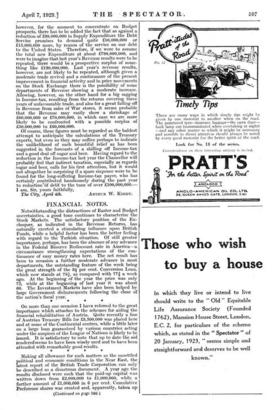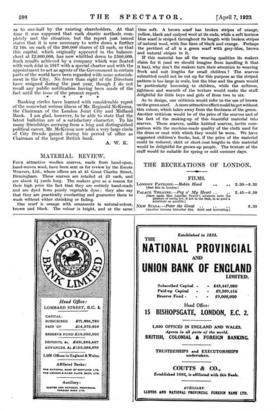FINANCIAL NOTES.
Notwithstanding the distractions of Easter and Budget uncertainties, a good tone continues to characterize the Stock Markets. The satisfactory position of the Ex- chequer, as indicated in the Revenue Returns, has naturally exerted a stimulating influence upon British Funds, while a helpful factor has been the better feeling with regard to the Turkish situation. Of still greater importance, perhaps, has been the absence of any advance in the Federal Reserve Rediscount rate in America—a circumstance strengthening expectations of the con- tinuance of easy money rates here. The net result has been to occasion a further moderate advance in most departments, the outstanding feature of the week being the great strength of the 8i per cent. Conversion Loan, which now stands at 78-1 as compared with 771 a week ago. At the beginning Of the year the price was only 75, while at the beginning of last year it was about 66. The Investment Markets have also been helped by large Government disbursements following the close of the nation's fiscal year. * * On more than one occasion I have referred to the great importance which attaches to the schemes for aiding the financial rehabilitation of Austria. Quite recently a line of Austrian Treasury Bills for £8,500,000 was placed here and at some of the Continental centres, while a little later on a large loan guaranteed by various countries acting under the auspices of the League of Nations is likely to be issued. It is satisfactory to- note that up to date the aid renderedseems to have been wisely used and to have been attended with remarkably good results.
Making all allowance for such matters as the unsettled political and economic conditions in the Near East, the latest report of the British Trade Corporation can only be described as a disastrous document. A year ago the results disclosed were such that the paid-up caigtal was written down from £2,000,000 to £1,000,000, while a further amount of 11,000,000 in 6 per cent. Cumulative Preference shares was created and, apparently, taken up (Continued on page 598 ) as to one-half by the existing shareholders. At that time it was supposed that such drastic methods com- pletely met the situation, but the report just issued states that it is now necessary to write down a further £2 10s. on each of the 200,000 shares of £5 each, so that this capital, which originally appeared in the balance- sheet at £2,000,000, has now whittled down to £500,000. Such results achieved by a company which was floated with such eclat in 1917 with a special charter and with the appointment to act as agents of the Government in certain parts of the world have been regarded with some astonish- ment in the City. No fewer than eight of the Directors have resigned during the past year, though I do not recall any public notification having been made of the fact until the issue of the present report Banking circles have learned with considerable regret of the somewhat serious illness of Mr. Reginald McKenna, the Chairman of the London Joint City and Midland Bank. I am glad, however, to be able to state that the latest bulletins are of a satisfactory character. To his many friendships accruing from a long and distinguished political career, Mr. McKenna now adds a very large circle of City friends gained during his period of office as Chairman of the largest British bank.
A. W. K.











































 Previous page
Previous page